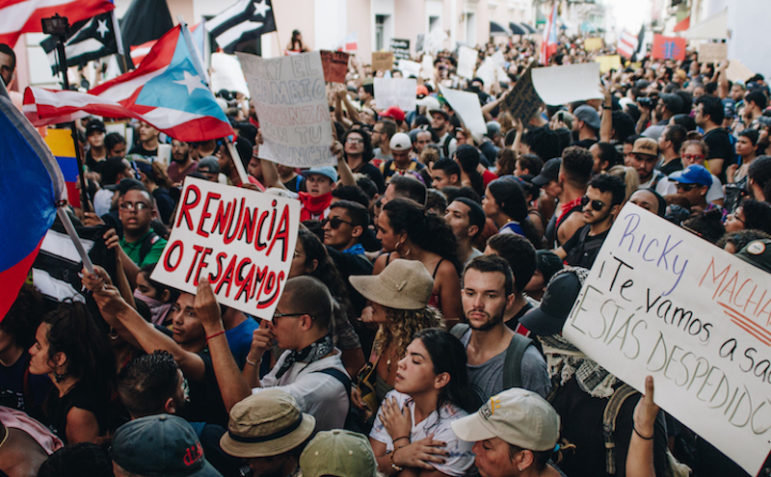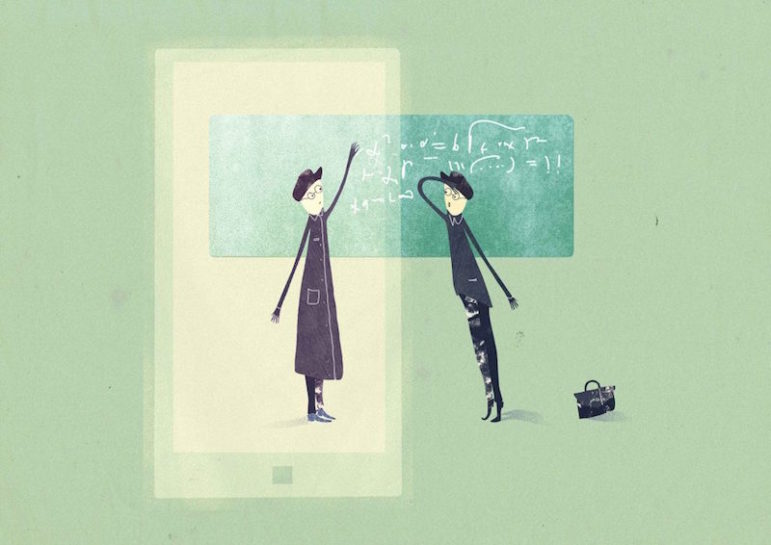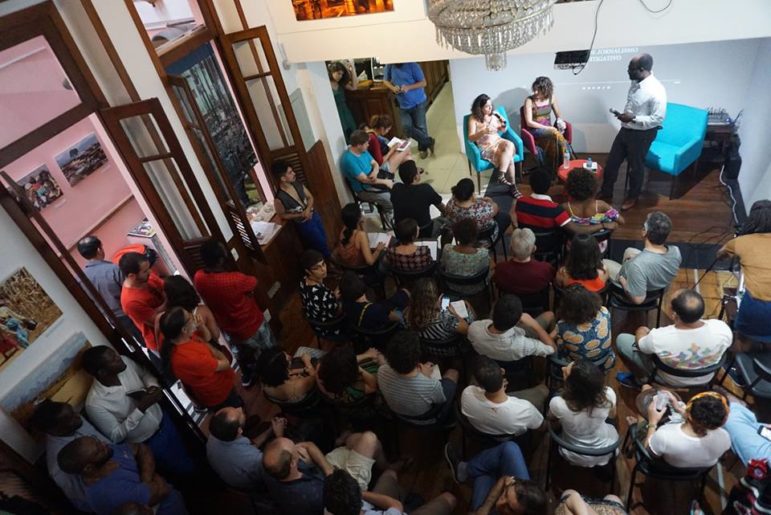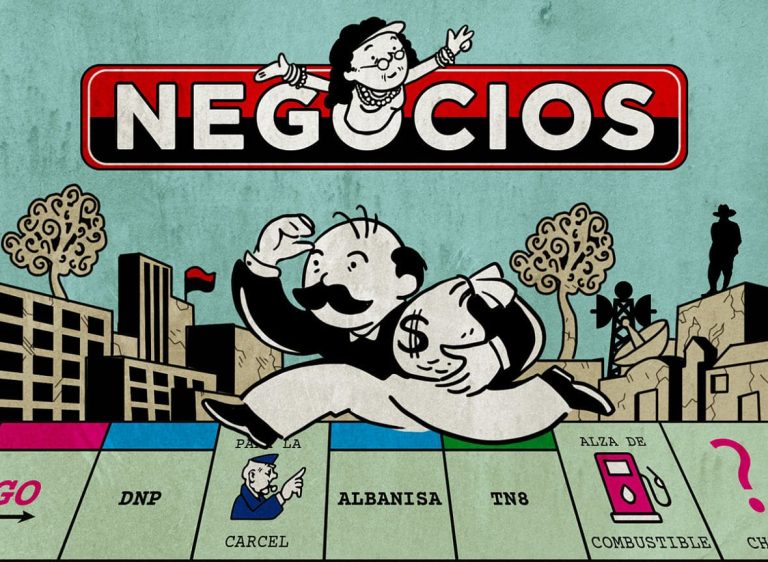

Photo: Mari B. Robles López / Center for Investigative Journalism (CPI)
How Leaked Chats and Dogged Reporting Shook Up Puerto Rico’s Government
Read this article in
When reporters for Puerto Rico’s Centro de Periodismo Investigativo — its Center for Investigative Journalism — first published hundreds of pages of a leaked Telegram chat involving high-ranking officials, they had no idea this would lead to massive street protests and end in the governor’s resignation. This huge story followed the Center’s award-winning work exposing how the death toll from Hurricane Maria in 2017 was far in excess of what officials admitted.
CPI, a GIJN-member nonprofit newsroom with 10 full-time reporters and editors, published 889 pages of leaked documents in July. These featured messages from a private group chat on Telegram. The memes and texts exchanged in this chat by then-governor Ricardo Rosselló and his inner circle, including Cabinet members and top aides, painted a damning picture: The discussion included insults and derogatory remarks about many different people, among them singer Ricky Martin and San Juan Mayor Carmen Yulín Cruz, as well as jokes about the victims of Hurricane Maria. A few pages of this chat had previously leaked to the press, but the effect of the full 889 pages was explosive, showing a seeming disregard for many of the problems plaguing Puerto Ricans, from unemployment to hurricane recovery.
DV.load(“https://www.documentcloud.org/documents/6409969-Chat.js”, {
responsive: true,
sidebar: false,
text: false,
pdf: false,
container: “#DV-viewer-6409969-Chat”
});
Just a few days after this initial bombshell, CPI published a second article, which revealed what it called “the corruption behind the chat.” This report outlined a complicated scheme whereby close collaborators of the governor allegedly pillaged public funds, with his knowledge. Several members of the Telegram chat were involved, according to CPI’s investigation.
These reports swiftly set off mass protests across the island, which culminated in Governor Rosselló announcing his resignation on July 24.
GIJN’s Gaelle Faure spoke to CPI’s executive editor Carla Minet to take stock of her busy summer and discuss what’s next for her team.
When you first published the leaked Telegram conversation, what reaction were you expecting?

Carla Minet. Courtesy: Puerto Rico Center for Investigative Journalism (CPI)
Carla Minet: We knew that we would get a lot of traffic. But we didn’t have time to think about other possible outcomes, like the one that turned out to be the real one! We didn’t have time because once we got the document of the chat, and we scrolled through it, we knew we had to publish as fast as we could. It was explosive. So we were mostly thinking about the need to put that information out, with the proper reporting.
What can you tell us about how you obtained the Telegram conversation?
Minet: I can tell you that we had been working on an investigation for a few weeks at that point, and that this investigation included some of the chat members — at least four of them. So in that process, we made contact with a source that we knew had access to the chat. At that point, a few pages of the chat had already been leaked into different media outlets. So there was a sort of expectation that had been created about the complete 889 pages of the chat. Everyone was looking for them. We asked the source to give us the whole document, because the source initially wanted to filter specific pages. We said no. We said we needed to see the whole document, because we didn’t want to view only a partial document that could show things out of context. And also because we needed the whole document to corroborate parts of our investigation.
You decided to publish all 889 pages of the chat in its original format — emojis, GIFs, and all. Was it important to you that readers be able to see the conversation in its entirety?
Minet: Definitely. There were so many important conversations in there that were disrespectful or insulting — to so many different officials or artists or communities — that we thought it was very relevant that people saw the whole document. The tone, the complicity — that is something that is difficult to get if you don’t see the whole thread. It wouldn’t have been fair to just publish a few parts and keep hidden the rest of what was said. Since the beginning, we knew we had to publish it all.

Former Governor Ricardo Rosselló. Photo: Gabriel López Albarrán / Center for Investigative Journalism (CPI)
Just a few days later, you published a major story about how members of the chat conversation had “pillaged public funds.” Can you tell me a little bit about the genesis of this investigation?
Minet: That investigation started a little over a month before it was published. We got curious because we heard a radio interview with Raúl Maldonado, who was the treasury secretary at the time, saying that there was a corruption network inside government agencies. Later that day, he was laid off by the governor. That was the spark that led us to formally initiate the investigation. From that point on, there were arrests of a few government officials by federal US authorities, like the secretary of education, Julia Keleher, and a top official in the health department, Angela Avila. So our investigation was aimed at connecting those dots and proving a hypothesis that we had: that the governor and his closest collaborators were involved and had knowledge of this corruption scheme.
We started finding sources from very different sides, even political sides, that coincided in terms of this information. We just went out there to conduct as many interviews as possible, to corroborate exact documents, exact dates — exact hours and places in which meetings took place, information was exchanged, and deals were made. And we spoke to more than 30 sources to corroborate the different details of the findings that we started making. The Telegram chat also corroborated some of the relationships between some of these individuals, specific events, and the tone in which they spoke to each other. The chat demonstrated the level of trust and familiarity between them, and how frequently they communicated.

The CPI team. Courtesy: Center for Investigative Journalism (CPI)
Were there any specific challenges that you ran into?
Minet: We faced the usual challenges of making such an investigation, in terms of many of the sources being anonymous. We got some very important sources on the record, but the amount of work and interviews that you make… You’re never able to put all that out there because of the risk that some people are taking. So I would say that the most difficult part was, in the beginning, just making people comfortable with talking to us, and then corroborating all those versions and making sense of the timeline. It was a classic investigation in that sense.
What’s maybe less classic about this one is the impact it had — did you ever think these stories would provoke such a huge outcry, and that the governor would end up resigning?
Minet: The day before we were going to publish [the first story], we asked for reactions from at least four of the public officials that were in the chat, and, of course, the governor. And there was complete silence on their part. They had already acknowledged the first leaks of the chat in a press conference and asked for forgiveness. We also corroborated specific dates and events on the document that could be fact-checked. At that point, it was very clear to us that they were in big trouble if they couldn’t deny having been part of the chat, or if they couldn’t question even the veracity of the document.
The name-calling was wrong — the insults and bullying and homophobia — but we were focused on the illegalities. So, we knew since the beginning that there would be legal consequences to the story. That’s not to say that at that point, we ever imagined that socially, it would have such an impact. People reacted to it in a very powerful way. It’s understandable that they reacted in that way, but as a journalist, you always hope that will happen with every single story that you publish, and that is not usually what happens. So it was unexpected in that sense.

Photo: Mari B. Robles López / Center for Investigative Journalism (CPI)
Why do you think it was this story that put people over the edge?
Minet: Puerto Ricans have been dealing with a fiscal and economic crisis for over a decade. We’ve been in a bankruptcy process for three years now, and we’ve been dealing with a fiscal control board imposed by the US government that makes decisions instead of our elected government. And then, hurricanes Irma and Maria hit in 2017. So when you put all these things together, and you look at how the living conditions of the people have worsened in many respects in the past years — in terms of health, in terms of employment opportunities, in terms of educational opportunities, and in general — then you have a real ticking bomb. All these conditions were oppressing people and making them feel like the government was not being fair to them. And then when you see this mocking, this disregard of people — of women, of LGBT, of the dead people… People were sensitive, and when they read this, I think it cut very deep.
Do you think either of these stories — the first story about the Telegram chat, or the second one about the corruption scheme — would have had such a huge impact if they had been published on their own?
Minet: Definitely not. It’s very clear to me that one without the other wouldn’t have caused the same impact. Even though the chat was important, and was the part that caught everyone’s attention, the story about the corruption deepened the information in terms of understanding that this was not only a character problem with these officials, but it was also a very deep systemic problem in our government. So I see them as a unit. The reason we couldn’t publish them at the same time was because the corruption story was not ready; we had sources that were still corroborating certain details. But of course, once we published the chat, we worked day and night to finish the second story.
CPI has published many other investigations over the past 11 years. Can you tell me about a few of the stories that had the biggest impact?
Minet: One of those that was very important in terms of social impact was about coal ash in the southern part of Puerto Rico. There is a coal plant that contaminated Puerto Rican towns, and we broke a very important story about how this also happened in the Dominican Republic.
We also published a big investigation about Monsanto in Puerto Rico. Puerto Rico is one of the first places for experimentation with Monsanto seeds, and they receive a lot of tax reductions and incentives to be here. Puerto Rico has been very generous to multinationals in terms of giving them incentives. We are like a tax haven for many of them.
The death toll of hurricane Maria was a huge story for us. The story began with us saying that there were a lot more corpses [than officials said], and doing an estimate on what would be the final death toll. We used the numbers we were getting from hospitals and local governments. Our number was almost 10 times what the government was saying. So then, as part of the follow-up process, we did crowdsourcing, got hundreds of tips from people whose family members had died. This investigation created a public outcry against the government. People organized a lot of public events and protests, and created a memorial where they brought shoes of their deceased as a way to remember the dead.

Damage from Hurricane Maria. Photo: Center for Investigative Journalism (CPI)
I hear you’ve been to court a lot…
We’ve been to court around 20 times. When our reporters face challenges in getting access to public documents, we go to court to get them. We have legal representation through a law clinic at the Interamerican University’s law school. This litigation sometimes takes a few weeks, sometimes a year or two. But we always end up getting the documents. We have a constitutional right to access to information, but that’s not very well known among the government officials, who can be very arbitrary about sharing documents. We have sued the government of Puerto Rico primarily, but also the US federal government and the Fiscal Control Board.
CPI shares its stories with others free of charge. Can you explain how that works?
Minet: We have at least 10 media partners in Puerto Rico, which are other online news outlets but also print, radio, TV, and news agencies. We also translate the stories and have media partners in the US, like the Miami Herald, Latino USA, and Latino Rebels, among others. We send the stories under embargo until an agreed time, and our partners decide if they want to publish them.
CPI has received a lot of attention in these past few months, including from celebrities like Lin-Manuel Miranda. How has that impacted you? Have you seen an increase in donations?
Minet: It’s been crazy. We’ve gotten lots of donations, in every way there is available to donate — Facebook Birthdays, Facebook fundraisers, PayPal, checks through the mail… We hadn’t asked for that, so it’s been very emotional for us to see this happening in a very authentic and spontaneous way. It’s too soon for exact numbers, but I think it’ll be at least a 300% increase in individual donations.
How is CPI funded, apart from individual donations?
Minet: We have funding from local Puerto Rico foundations and US foundations. Our major funders include Red de Fundaciones de Puerto Rico (Puerto Rico Funders Network), Open Society Foundations, Ford Foundation, Oxfam America, Fundación Segarra Boerman, and María Fund, among others. We also do events, and at those events, we do corporate sponsorships. We sell T-shirts, bags… all the usual ways news nonprofits manage to raise funds!
This year, our budget is $1 million. But we started in 2007 with a zero-dollar budget; it took over a year to establish the basics for the organization — to get a board of directors, get an office, and start operating formally. A lot of work was done pro bono by our founders in that time. The first years, the Interamerican University Law School hosted CPI and also sponsored part of its operation, and the first important grant we got was from the Ethics and Excellence in Journalism Foundation. That’s when CPI was able to hire its first executive director, Laura Candelas.
CPI struggled for years to receive attention and funding. What would you recommend to other investigative nonprofits working in similarly tough conditions?
Minet: Just do it. It is a very challenging project and you have to be very consistent and persistent to gain trust and credibility, to make a place in the minds of an audience that is used to having light content or politically-filtered information. Also, being a nonprofit poses additional barriers; growth is slower than a regular news outlet that begins with seed money or investors or publicity. But when you make the right partnerships, you pick a team that is passionate and has promise, you train them continuously, and you engage with the community and earn its trust, you can get to a point at which you have a successful operation. Your journalistic work has to be unquestionable, bulletproof, always — that’s the main thing.
What’s in store for CPI?
Minet: We are very enthusiastic about people looking into our work since all this happened. We feel there are a lot of expectations right now, and so we’re trying to deal with that and keep up the good work. I think these are interesting times — it’s been an opportunity to put into perspective what journalism can do in terms of changing things in society. That makes us hopeful. And of course, we’re working on more investigations. Recovery after Hurricane Maria has been very slow, and we put together a special team to follow stories that explain how the recovery funds have been distributed, how the money has been spent, why it’s not getting where it needs to go, etc. And of course, we’ll also have more stories about corruption, corporate deals, etc. — just like always!
Carla Minet will be speaking at the 11th Global Investigative Journalism Conference this week in Hamburg, Germany, on corruption in public works and investigating disasters.
 Gaelle Faure is GIJN’s associate editor. Previously, she worked for France 24, where she specialized in social newsgathering and verification. She has also worked as an editor for News Deeply and reported for Time Magazine.
Gaelle Faure is GIJN’s associate editor. Previously, she worked for France 24, where she specialized in social newsgathering and verification. She has also worked as an editor for News Deeply and reported for Time Magazine.









